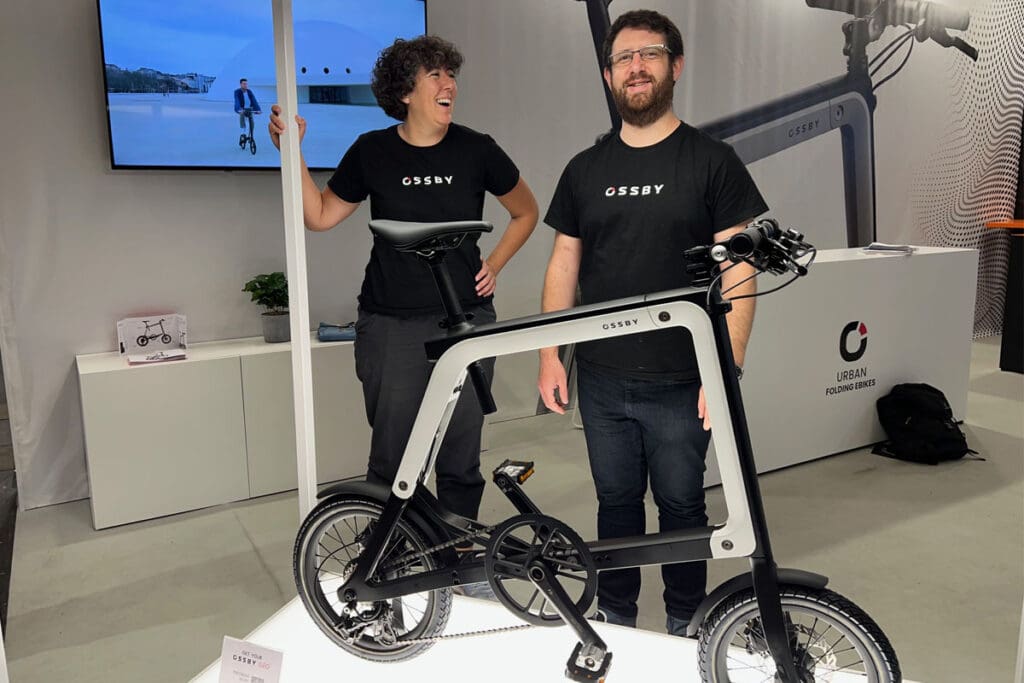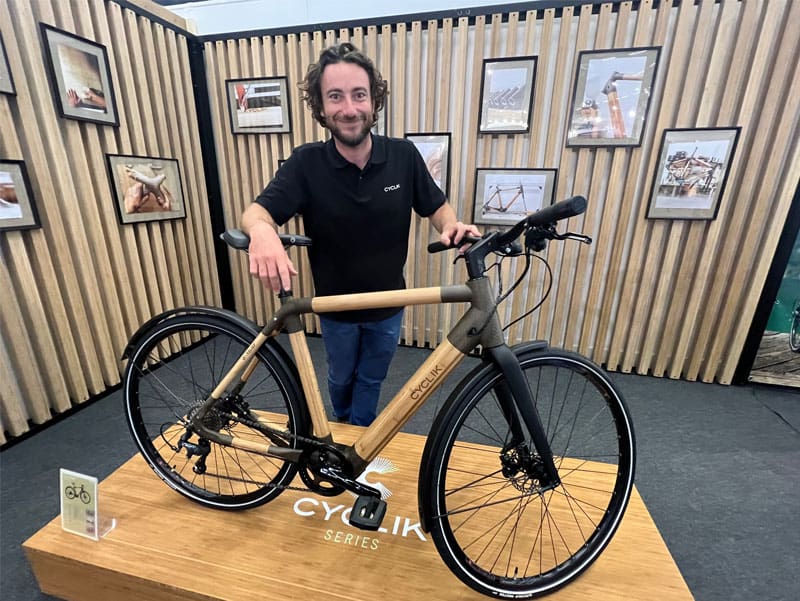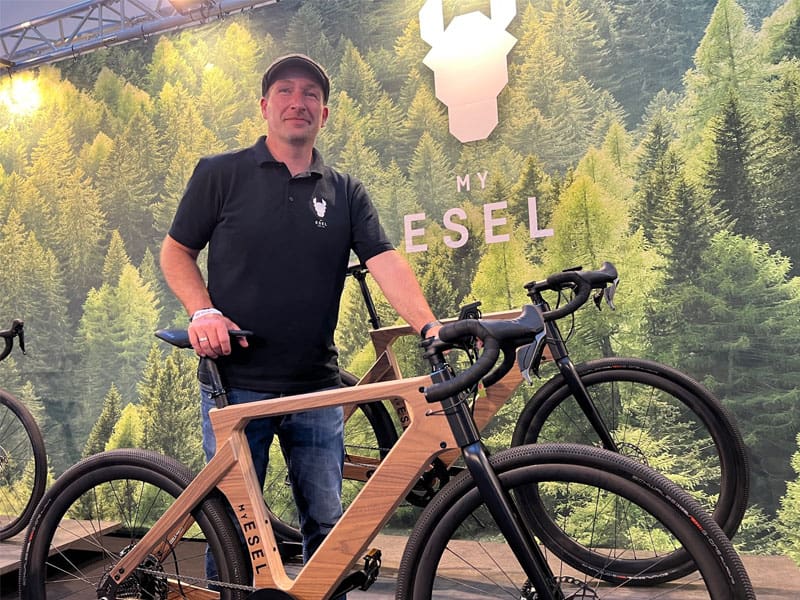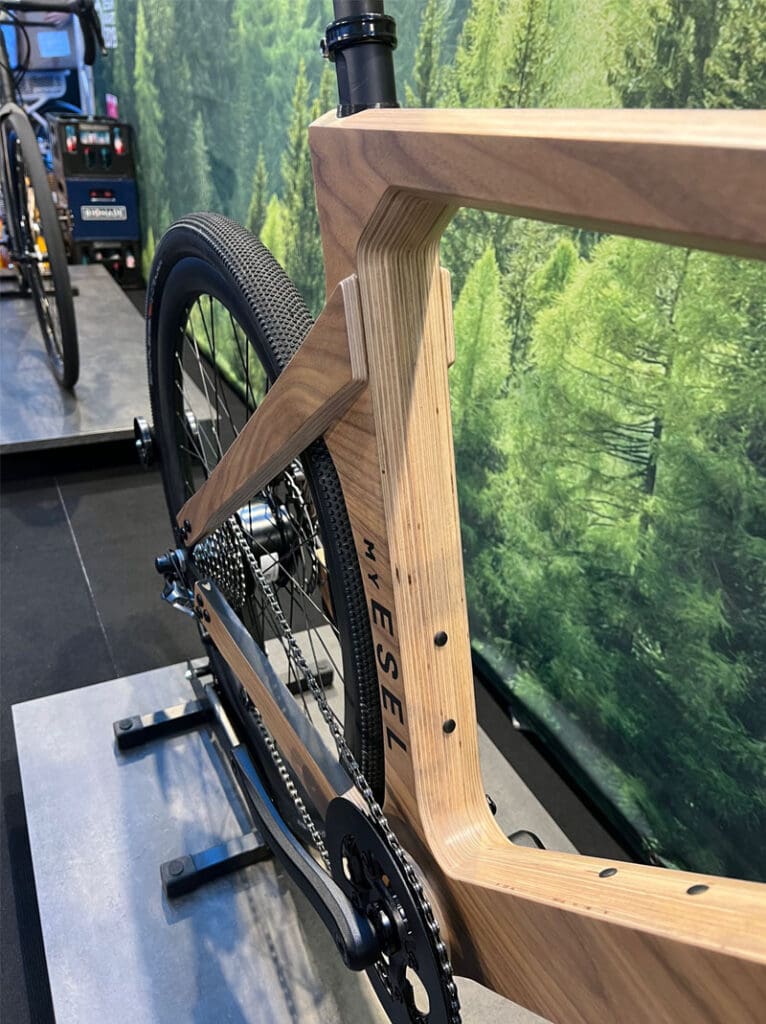E-Bike Material Innovations: Ossby, Cyclik & My Esel

Frankfurt, Germany
Bicycle manufacturers continue to experiment with new materials – in their quests for greater sustainability, durability or just a better ride – with several major innovations on display at Eurobike 2023.
While Madrid company Ossby attracted attention for the radical design of its Geo folding bike – and very rapid folding mechanism – its use of recycled fibreglass from wind turbines was equally notable.
The Geo’s frame, constructed in Madrid, is produced from a combination of recycled fibreglass and vegetable resin.
Ossby was launched just two years ago but is collaborating with a company that has been working on the fibreglass recycling process for a number of years.
Osbby says the recycled product is more sustainable, resistant and lighter than aluminium, which makes the bike very light, easy to fold and transport.
Similarly, the company sources the vegetable resin from a Valencia operator who has been working on it for many years in the automotive and aerospace sectors.
Ossby chief technical officer Chad Singer said it finalised the Geo’s design at the end of last year and production is underway.
“We were looking to develop a mobility gadget rather than a bike,” he said.
The result is an e-bike that can fold down in around a second.
“If everything goes as scheduled, we hope to start shipping in September, for distribution with Merida in Spain, Portugal, France and Andora,” Chad said.
“If we can start production by September, we hope to make 1500 units this year … then 3000 to 3500 the following year.”

Cyclik
Bamboo bike frames are nothing new but French company Cyclik is the first manufacturer to bind the bamboo tubes together using linen lugs.
Cyclik last year patented its technology to make lugs from linen and resin.
Company spokesperson Damien Guerrero said the unique lugs not only created frames that are light, vibration absorbent and extremely strong – they are also quick to construct.
Damien said each frame can be fully manufactured in four hours.
When founder Felix Hebert started Cyclik six years ago, he wanted to create bikes made with natural fibres and looked at alternatives to the usual aluminium lugs used for bamboo frames.
The linen lugs are produced in moulds made of wax and then baked to create their strength and to remove the wax.
Damien said the process can create 8kg bikes, while the electric cross model is 16kg. It is fitted with a Mahle X35 rear hub motor and a 250kW hour battery pack, with the option for an extra battery mounted in the seat tube bidon cage.
Cyclik has capacity to build 500 bikes a year and will begin with the French market, before branching out into other parts of Europe.
He said the company has already started producing custom frames and is looking to add a gravel model next year.

My Esel
Austrian company My Esel unveiled the world’s first wooden gravel e-bike.
After releasing a non-electric version last year, My Esel finished development of the e-gravel bike just two weeks before Eurobike and had a prototype on display.
The layered frame uses a combination of ash and birch for the internal layers. While ash is a particularly flexible wood, birch is especially light and soft, making it easier to create channels for cabling.
Walnut is used for the outer layers because of its durability and aesthetics.
My Esel cofounder Heinz Mayrhofer said they were looking to have the first production e-gravel bikes available in the market by the first quarter of 2024.

The e-gravel weighs 8.5kg and comes with a 42nM rear hub motor developed inhouse.
Heinz said the hub was developed to be significantly lighter than the 60nM motor My Esel puts on its wooden e-cross bike.
He said his cofounder, Christoph Kraundorfer, started developing wooden bikes because, at two metres tall, he had knee problems caused by riding frames with standard dimensions.
An architect by trade, he experimented with wood to build his own bikes and discovered a number of advantages, including the fact it offers plenty of opportunity to customise the frame.
Heinz said it is also similar in stiffness to carbon and the fibres provide a very comfortable but performance orientated ride.
The e-gravel is expected to retail for €4,750 (A$8,025) – €6,000 (A$10,136), depending on the choice of 250-watt or 400-watt battery, compared to €3,950 (A$6,673) for the non-electric option.
